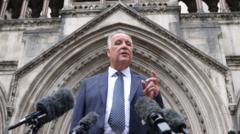Will the Council's Asylum Hotel Appeal Reach the Supreme Court?

Published: 2025-09-02 21:00:49 | Category: technology
This article discusses the recent legal developments regarding a council's attempt to prevent an Epping hotel from housing asylum seekers. The Epping Forest District Council's appeal to the Supreme Court was denied, following an overturn of a temporary injunction that would have required the removal of migrants from The Bell Hotel.
Last updated: 27 October 2023 (BST)
Key Takeaways
- The Epping Forest District Council lost a legal attempt to appeal to the Supreme Court regarding asylum seekers housed at The Bell Hotel.
- A temporary injunction previously secured by the council was overturned by the Court of Appeal.
- The council plans to seek permission to appeal directly to the Supreme Court despite the recent ruling.
- Protests at the hotel have increased, and the local council leader has urged for calm amid community strain.
- A full High Court hearing to discuss a permanent injunction is scheduled for October.
Background on the Asylum Seeker Housing Controversy
The situation surrounding The Bell Hotel in Epping, Essex, has been a point of contention for months. The Epping Forest District Council, led by Conservative councillor Chris Whitbread, has actively sought to stop the Home Office from placing asylum seekers at this site. The council argued that the site owner, Somani Hotels, breached planning regulations by failing to notify them of these plans.
In September, the council secured a temporary injunction from the High Court, mandating that asylum seekers vacate the hotel. However, this injunction was overturned by the Court of Appeal, which ruled that the council's arguments did not warrant such an order. This decision was a significant setback for the council, prompting them to explore further legal avenues, including a possible appeal to the Supreme Court.
The Legal Proceedings: A Timeline
Understanding the timeline of events can help clarify the complexities of this legal battle:
- September 2023: The High Court grants a temporary injunction requiring asylum seekers to leave The Bell Hotel by 12 September.
- September 2023: The Court of Appeal overturns the temporary injunction, allowing asylum seekers to remain at the hotel.
- Late September 2023: The Court of Appeal rules that the case cannot proceed to the Supreme Court, but the council considers making a direct request.
- October 2023: A full High Court hearing is scheduled to discuss a permanent injunction against housing asylum seekers at the hotel.
Community Response and Protests
The protests against the housing of asylum seekers at The Bell Hotel have been intense. Following the recent arrest of an asylum seeker on serious charges, including sexual assault, tensions have escalated. Local residents have expressed concerns about safety and the impact of these events on their community.
Councillor Whitbread has called for an end to the protests, stating that the town is "under great strain." He emphasised the importance of considering the local community's well-being, especially with children returning to school. The council leader's appeal to protesters was for them to protest peacefully and with respect for local residents, highlighting the need for calm amidst increasing unrest.
Legal Implications for Asylum Seekers
As it stands, there are currently 138 asylum seekers residing at The Bell Hotel. The ongoing legal disputes and protests have raised several questions about the treatment of asylum seekers in the UK, particularly regarding the use of hotels as temporary accommodation.
The legal framework surrounding asylum accommodation is complex, involving both local government regulations and national policies. Local authorities often find themselves at odds with the central government, which places migrants in facilities without prior consultation. This conflict can create significant challenges for local councils trying to uphold community standards and safety.
What Happens Next?
Looking ahead, the Epping Forest District Council plans to pursue a full High Court hearing in October to argue for a permanent injunction against the housing of asylum seekers at The Bell Hotel. The outcome of this hearing could set a significant precedent for how local councils manage asylum accommodation in their areas.
Moreover, the possibility of appealing to the Supreme Court remains on the table, although the Council has yet to receive any formal reasoning for the denial to proceed with that appeal. The council believes they have a strong case for further legal action, which could lead to broader implications for asylum seeker policies across the UK.
Conclusion
The legal battle over The Bell Hotel in Epping highlights the ongoing tensions between local authorities and national policies regarding asylum seekers. As communities grapple with the challenges posed by housing migrants, the outcome of the upcoming High Court hearing may significantly influence future approaches to asylum accommodation. With protests continuing and community sentiments mixed, the situation remains fluid and complex. How local councils adapt to these challenges will be critical in shaping the future of asylum seeker housing in the UK.
As this situation unfolds, it raises questions about community integration, the responsibilities of local councils, and the rights of asylum seekers. Will legal frameworks adapt to better support local needs while ensuring asylum seekers are treated fairly? #Epping #AsylumSeekers #LocalGovernment
FAQs
What is the current status of asylum seekers at The Bell Hotel?
Currently, there are 138 asylum seekers residing at The Bell Hotel in Epping, following the Court of Appeal's decision to allow them to remain despite the council's attempts to secure a temporary injunction.
Why did the Epping Forest District Council seek to remove asylum seekers from the hotel?
The council argued that the hotel owner breached planning regulations by not notifying them of the accommodation plans. They also expressed community concerns over safety and the impact of housing asylum seekers in the area.
What are the next steps for the council regarding the legal proceedings?
The council plans to pursue a full High Court hearing in October to discuss a permanent injunction against housing asylum seekers at The Bell Hotel and is considering appealing to the Supreme Court.
What impact have the protests had on the local community?
The protests have increased tension within the community. Local leaders, including Councillor Whitbread, have called for calm, emphasising the need for peaceful demonstrations and consideration for residents' well-being.
What legal options does the council have following the Court of Appeal's decision?
The council can seek permission to appeal directly to the Supreme Court regarding the overturning of the temporary injunction and proceed with the scheduled High Court hearing for a permanent injunction.



